Opinion

The themes associated with “Gangster rap” and its successor, “Trap music,” are often thought of as being as far away from Christian morals as the east is from west. Heavy on percussion and profanity, its tracks hit hard and depict the violence of black life interspersed with tales of excess, sex, and money. While some may discount hip-hop music as vulgar entertainment, it indicates a people’s great hunger for getting more out of this world.

No one should have to go hungry.
Unfortunately, the Trump administration has proposed a plan that will increase hunger in urban and rural communities across the country. Under a new rule proposed by the U.S. Department of Agriculture, “able-bodied adults without dependents” will find it harder to receive benefits from the Supplemental Nutrition Assistance Program, or SNAP, formerly known as food stamps.

Maybe it was Rev. William Barber’s preaching that touched me with the moral call to climate justice, in partnership with Al Gore, whose organization Climate Reality Project brought this audience together for a three-day training. Later that night, I realized why the message felt personal: Barber pushed me to reframe my conversations with my daughters about climate justice in this country. I teach environmental education at a small college in North Carolina, but the way I communicated at home around the kitchen table needed a transformation.
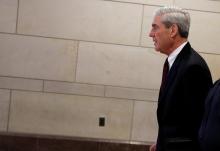
Discernment. That is what is most needed in a week of news like this one.
Donald Trump won the legal battle in this last week. Now he is trying to win the political battle. But the most important questions remain more than legal or even political: They are moral and ethical, and they are about the soul of America.

From Friday the 13th to Halloween, there’s nothing I love more than a great horror film that has a good twist at the end. Though they tend to follow the same predictable plot, I still enjoy the ride. Yet, there has never been a horror film that has stayed with me — until I watched Us directed by Jordan Peele. I sat in my car for 20 minutes thinking of how uneasy I felt, which I believe was the point of the film: to leave you unsettled. After watched it, I realized that Peele has not only created a haunting piece of art but has also proven to be a craftsman in the art of subversion. This film makes you question who you perceive to be the other and how that conflict manifests in our world.
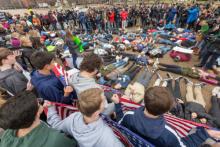
Prayer in the fearful context of gun violence is mysterious to me. I’m still surprised the first thing through my mind, huddled in a classroom corner was this: Praise God from whom all blessings flow… The doxology. Without knowledge of who fired the shot that echoed through the hall, or if the footfalls beyond the door would bring security or more chaos, I had, amazingly, some peace from this liturgical breath prayer. I gripped my friends’ hands and asked God to intervene - to save the shooter who was a child lost and in danger.
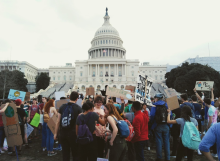
8-year-old activist Havana Chapman-Edwards, also known as the Tiny Diplomat, closed that day with a powerful statement on climate justice intersectionality. “I am here today because climate justice issues are not separate from other justice issues. It’s not right that wildfires, droughts and other climate disasters are being ignored. Black, indigenous, and people of color are doing the least damage to the planet but we are the ones who are paying the price first.”

In December, the EPA proposed to stop regulating hazardous air pollutant (HAP) emissions from power plants altogether under the Mercury Rule (Mercury and Air Toxics Standards), stating that it was no longer “appropriate and necessary” to do so after a limited cost-benefit analysis. Because of its imminent threat to the health of our nation, particularly people of color, women, and children, Sojourners felt called to take action on this issue.
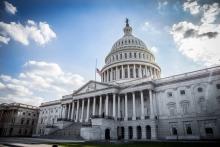
VAWA expired back in February, leaving shelters and survivors worried about their futures. However, on March 7, Rep. Karen Bass (D-CA) and Rep. Brian Fitzpatrick (R-PA) introduced an expanded version of VAWA in the House. While it’s been introduced bipartisanly, it’s almost entirely supported by Democrats, who comprise 110 of its 111 co-sponsors. VAWA is reauthorized every five years and with each new reiteration has been expanded to offer new services for communities and individuals that are suffering. In the latest proposed legislation, many Republicans object to assisting two of the communities designated for special protections: Native Americans and transgender individuals.
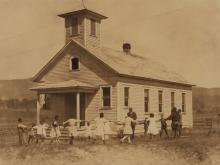
How do I explain this to Simon, the fact that large-scale neighborhood segregation too often goes hand in hand with economic deprivation. How do I tell him that it’s not that white people aren’t allowed, it’s that they are exercising their power to opt out? That Brown v. Board could only open school doors for black students, that it couldn’t keep white students from walking away? In other words, how do I explain the legacies of slavery and Jim Crow to a young child?

As humans, we have an innate desire to see and understand. We want to feign comprehension, in order to avoid the despair of our limited understanding. I’ve noticed this phenomenon recently in what started as a personal experience. I was born with a rare genetic condition that causes my skin to blister much more easily than the average person. It is my normal. There are not many people on the planet who can actually understand. However, this has not stopped countless people from trying to convince me they do.
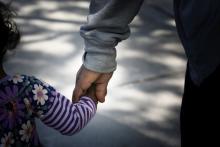
Being a parent is to get a front row seat to the construct of being human — from the intense physical engagement of a variety of bodily functions — feeding, pooping, bathing — to emotional regulation, and profound spirituality. As I argue in my book, parenting children is one of the most critical strategies in creating justice, beauty, and carrying out the work of God in our world.

The New Zealand white power killer, a 28-year-old white Australian man, murdered 50 Muslims while they were worshipping and injured 50 more in two deadly Mosque shootings — the deadliest event of its kind in New Zealand’s history. He cited as inspiration Dylann Roof, a young white American man who murdered nine African-American Christians while they were studying the Bible at Mother Emanuel American Methodist Episcopal Church, in Charleston, S.C., after they had invited the stranger into their Bible study.
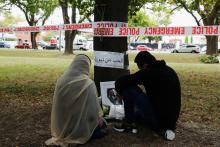
The struggle against hatred is as old as humans, and it will continue after each of us is gone from the planet. But God has given us this moment to join the struggle against the ideologies that that inflict such evil upon our families, our communities and our world.
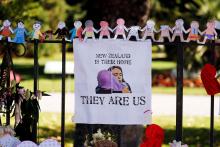
As executive director of the Shoulder to Shoulder Campaign, my professional life is concentrated on counteracting anti-Muslim discrimination and violence. When I started this work, there were many from my white Christian community of origin that wondered if I had converted to Islam — as if that’s why I started doing this work. I understood where the people asking this question were coming from, but the assumption behind it bothered me. They assumed the only reason Christians would care about anti-Muslim hate in the United States is if they had converted to Islam themselves. The assumption caused me to dig deeper into why I would care enough about this issue to devote myself to it not in spite of my Christian identity but because of it.

In our faith walk, there is much to celebrate, but insistently characterizing life as a triumphant march from glory to glory can alienate people who don’t find life quite as sunny. Church culture can feel painful for people who deal with various health issues or certain kinds of inner suffering that make it difficult to sense God’s presence. There’s little discussion in church of the “dark nights” that are a normal part of the faith journey, or the fact that such nights can last for years in some cases.
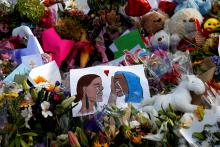
Let me tell you what it’s like to walk into a classroom studying world religions after a mass shooting at a house of worship. I know because I’ve done it twice in six months. Last October, my students and I returned to class after 11 people were gunned down in Pittsburgh during Shabbat services. Last Friday, we awoke to a shooting that killed 50 people during Jumu'ah prayers at a New Zealand masjid.

So where can we find hope, and how can we actually move the needle on climate change? By doing three things: One, Americans should follow a moral compass, not a political one. Two, we must focus on bringing change locally. And three, religious leaders should lead the charge by imploring followers — in churches, synagogues, mosques, or temples — to see the moral and theological imperative of protecting all of God’s creation.

The idea that black and brown students possess the intellectual prowess to compete and succeed alongside their white counterparts is not a myth, it’s a fact. But, historically, black and brown students have not been allowed to showcase this intelligence in institutions of higher education.
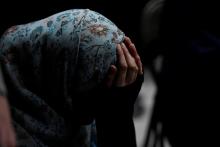
The church has failed to speak out strongly enough against the evils of white supremacy and white nationalism. We have failed to confront it, even name it for what it is. Our complacency has laid the foundation that this act of terror was built on. We can tweet our “thoughts and prayers” and post our condemnation of this vile act but if we don’t examine ourselves, we will continue to be complicit in this atrocity.